As we age, the foods we eat can greatly affect our fitness, appearance, quality of life, and disease risk. Our bodies rely on various nutrients to support the natural aging process.

Nutrients like antioxidants play a crucial role in maintaining healthy skin. The right diet can help slow signs of aging, promoting a youthful appearance and overall health.
Key Takeaways
- Eating the right foods can help slow down the aging process.
- A diet rich in fruits and vegetables is crucial for maintaining healthy skin.
- Nutrients like antioxidants support the natural aging process.
- A healthy diet can promote a youthful appearance and overall health.
- Understanding the connection between nutrition and aging is key to maintaining a healthy lifestyle.
The Science Behind Anti-Aging Nutrition
Anti-aging nutrition is rooted in the science of how our diet influences the aging process at a cellular level. The foods we consume play a significant role in either accelerating or decelerating the aging process, impacting our skin health and overall well-being.
Nourishing the Body
The aging process is influenced by both internal factors, such as genetics and metabolism, and external factors, including diet, environment, and stress. At the cellular level, aging is largely driven by oxidative stress, which occurs when there’s an imbalance between free radicals and antioxidants in the body.
| Factor | Impact on Aging |
|---|---|
| Internal Factors (Genetics, Metabolism) | Influence aging rate and cellular health |
| External Factors (Diet, Environment, Stress) | Affects oxidative stress levels and skin health |
| Oxidative Stress | Causes cellular damage and accelerates aging |
The Role of Antioxidants and Free Radicals
Free radicals are unstable molecules that damage cells through oxidation, contributing to visible signs of aging like wrinkles and loss of skin elasticity. Antioxidants work as protective agents that neutralize free radicals, effectively slowing the aging process. Consuming a diet rich in antioxidants can help maintain a healthy balance and promote youthful skin.
Understanding Skin Aging and Nutrition
The health of our skin is closely linked to our nutritional intake, and a diet rich in essential nutrients can support skin health. As we age, our skin undergoes various changes, including wrinkles, fine lines, loss of elasticity, dryness, and uneven pigmentation.
Nutrition plays a critical role in skin health and the visible signs of aging. A diet lacking essential nutrients can lead to premature aging of the skin, while a balanced diet can help maintain a more youthful appearance.
How Nutrition Impacts Skin Health
The skin‘s structure depends on proteins like collagen and elastin, which naturally decrease with age but can be supported through proper nutrition. Hydration also plays a critical role in maintaining skin moisture and elasticity.
- Nutrient deficiencies often manifest in the skin, making it an indicator of overall nutritional status.
- A diet rich in antioxidants, healthy fats, and essential nutrients supports skin health.
Key Nutrients for Youthful Skin
Key nutrients for skin health include vitamins A, C, and E, zinc, selenium, omega-3 fatty acids, and amino acids. These nutrients support different aspects of skin structure and function.
| Nutrient | Benefit to Skin |
|---|---|
| Vitamin C | Boosts collagen production |
| Omega-3 Fatty Acids | Reduces inflammation |
| Zinc | Supports wound healing |

Powerful Anti-Aging Foods Rich in Antioxidants
Incorporating antioxidant-rich foods into your diet is a crucial step in combating the signs of aging. Antioxidants play a vital role in protecting the skin from damage caused by free radicals, which can lead to premature aging.

Berries: Nature’s Anti-Aging Powerhouses
Berries, particularly blueberries, strawberries, and blackberries, are rich in anthocyanins, powerful antioxidants that help protect skin cells from damage. Blueberries, for instance, contain vitamins A and C, as well as anthocyanin, which gives them their deep blue color and helps moderate the body’s inflammatory response.
Dark Chocolate: Sweet Anti-Aging Benefits
Dark chocolate with at least 70% cocoa content is a delicious addition to an anti-aging diet. It contains flavonols that improve skin hydration and thickness while protecting against sun damage.
Green Tea: Sip Your Way to Younger-Looking Skin
Green tea is high in antioxidants, particularly catechins like EGCG, which have been shown to rejuvenate dying skin cells and support skin elasticity. Regular consumption of green tea may help reduce external skin aging caused by environmental stressors.
These antioxidant-rich foods work synergistically to provide comprehensive protection against multiple factors that contribute to skin aging, making them a cornerstone of any effective anti-aging nutrition plan.
Omega-Rich Foods That Combat Aging
To achieve radiant, healthy skin, it’s essential to consume foods rich in omega-3 fatty acids. These essential fats play a crucial role in maintaining skin health by strengthening the skin’s lipid barrier, which helps retain moisture and protect against environmental damage.

Fatty Fish: Salmon and Other Skin-Loving Options
Fatty fish like salmon, mackerel, and sardines provide EPA and DHA, the most bioavailable forms of omega-3s. These nutrients help regulate oil production and reduce inflammation in the skin. Salmon, in particular, contains astaxanthin, a carotenoid antioxidant that helps protect skin from UV damage and improves elasticity when consumed regularly.
Plant-Based Omega Sources: Flaxseeds and Walnuts
For those who don’t consume fish, plant-based omega sources like flaxseeds, chia seeds, and walnuts provide alpha-linolenic acid (ALA), which the body partially converts to EPA and DHA. Studies have shown that women who consumed flaxseeds or flaxseed oil for 12 weeks experienced increased skin hydration and smoothness.
| Food | Omega-3 Content | Benefits |
|---|---|---|
| Salmon | EPA, DHA | Reduces inflammation, improves skin elasticity |
| Flaxseeds | ALA | Increases skin hydration, smoothness |
| Walnuts | ALA | Supports overall health, reduces inflammation |
Vitamin-Packed Fruits for Age-Defying Results
Vitamin-packed fruits offer a natural solution for age-defying results. These fruits are rich in essential nutrients that support skin health, cell regeneration, and protection against environmental damage.

- Papaya, which contains the enzyme papain and vitamins A, C, and E to provide natural exfoliation and reduce inflammation.
- Avocados, rich in healthy fats, fiber, and various vitamins and minerals that moisturize the skin from within.
- Pomegranates, high in antioxidants and fiber, which help preserve collagen and protect against UV damage.
Papaya: The Tropical Anti-Aging Fruit
Papaya contains papain, an enzyme that offers additional anti-aging benefits by acting as a natural anti-inflammatory agent. Its high vitamin C content supports collagen synthesis and helps neutralize free radicals.
Avocados: Healthy Fats for Youthful Skin
Avocados deliver a powerful combination of vitamin E, healthy monounsaturated fats, and antioxidants that help protect skin from oxidative damage.
Pomegranates: Ancient Anti-Aging Superfood
Pomegranates contain unique compounds that help preserve collagen in the skin and may protect against UV damage, making them effective for maintaining skin elasticity.
Incorporating these foods into your diet can lead to healthier, more youthful-looking skin. By consuming a variety of vitamin-rich foods, you can support your overall health and achieve a more vibrant appearance.
Vegetables That Help Slow Down Aging
Incorporating vegetables into your diet is a powerful way to combat the aging process. Vegetables are rich in antioxidants, vitamins, and minerals that help slow down aging by fighting oxidative stress and supporting cellular regeneration.
Leafy Greens: Spinach and Watercress
Leafy greens like spinach and watercress are packed with vitamins A and C, which support skin cell turnover and collagen production. Watercress also acts as a natural skin antiseptic, boosting circulation and delivering oxygen and nutrients to skin cells.
Broccoli: A Collagen-Boosting Vegetable
Broccoli provides a unique combination of vitamins C and K, along with sulforaphane, which helps protect against UV damage and may activate protective pathways in the skin, supporting overall skin health.
Red Bell Peppers: Vitamin C Champions
Red bell peppers are exceptionally high in vitamin C, making them ideal for collagen production and skin repair. The carotenoids in colorful vegetables like bell peppers help protect skin against sun damage, a primary cause of premature aging.
By incorporating a variety of colorful vegetables into your diet, you can provide comprehensive protection against multiple factors that accelerate the aging process, helping to maintain a youthful appearance and support overall health.
Healthy Oils and Fats for Anti-Aging
When it comes to anti-aging, the type of fat you consume is just as important as the amount. Healthy oils and fats are essential for maintaining skin moisture, elasticity, and the integrity of cell membranes, making them a crucial component of an anti-aging nutrition plan.
The Benefits of Extra Virgin Olive Oil
Extra virgin olive oil is renowned for its health benefits, particularly in reducing inflammation and oxidative stress. Rich in monounsaturated fats and antioxidant properties, it helps protect the skin from aging.
- Contains powerful polyphenols that combat oxidative stress
- Helps maintain skin elasticity
- Reduces the risk of severe skin aging
Avocado Oil for Skin Health
Avocado oil is another healthy fat that supports anti-aging. It penetrates skin cells effectively and is rich in vitamin E and antioxidant properties, helping to neutralize free radicals and improve skin hydration.
| Oil | Key Benefits | Impact on Skin |
|---|---|---|
| Extra Virgin Olive Oil | Rich in monounsaturated fats, antioxidant properties | Maintains skin elasticity, reduces inflammation |
| Avocado Oil | High in vitamin E, penetrates skin cells effectively | Improves skin hydration, neutralizes free radicals |
Protein Sources That Support Collagen Production
As we age, our body’s natural collagen production declines, making it essential to consume protein-rich foods that support skin health. Collagen is the body’s most abundant protein, providing structural support to the skin, but its production naturally declines with age, leading to wrinkles and sagging.
To maintain healthy, youthful-looking skin, it’s crucial to include a variety of protein sources in your diet. Collagen peptides are smaller, more digestible forms of collagen that have been shown to improve skin elasticity, moisture, and firmness while reducing wrinkles.
Collagen Peptides: Direct Support for Skin Structure
Consuming hydrolyzed collagen peptides can directly support skin structure by improving skin health. Studies have demonstrated that these peptides can enhance skin elasticity and reduce the appearance of fine lines and wrinkles.
Plant and Animal Proteins for Skin Health
In addition to collagen peptides, both animal-based and plant-based proteins play a crucial role in supporting skin health. Animal-based protein sources like bone broth, chicken, fish, and eggs contain amino acids glycine, proline, and hydroxyproline, which are essential for collagen production. Plant-based proteins such as legumes, tofu, and quinoa also provide amino acids that support collagen synthesis when combined properly.
It’s also important to consume vitamin C-rich foods alongside protein, as vitamin C is a crucial cofactor for collagen production and helps stabilize collagen molecules. By incorporating a variety of protein sources into your diet, you can ensure you’re getting all the essential amino acids needed for optimal skin health and collagen maintenance.
- Protein is essential for maintaining and repairing body tissues, including skin.
- Adequate protein intake is crucial for collagen production and maintenance of skin structure.
- Both animal-based and plant-based proteins can support collagen synthesis.
Anti-Inflammatory Foods That Combat Aging
The role of anti-inflammatory foods in anti-aging cannot be overstated, as they address one of the root causes of aging. Chronic inflammation accelerates the aging process throughout the body, including the skin, making anti-inflammatory foods essential components of an effective anti-aging nutrition strategy.
Turmeric and nuts are two examples of anti-inflammatory foods that have potent antioxidant properties. Turmeric contains curcumin, a powerful bioactive compound with potent anti-inflammatory and antioxidant properties.
The Golden Anti-Aging Spice: Turmeric
Turmeric, especially curcumin, shows incredibly strong antioxidant activity that may directly reduce skin aging. This includes preventing moisture loss and protecting against wrinkles. In addition to its potential healthy skin-supporting properties, turmeric has also been found to be immune-boosting and anti-inflammatory.
Nuts and Seeds: Small Packages with Big Benefits
Nuts are an excellent source of vitamin E, which can help repair skin tissue, retain skin moisture, and protect skin from UV damage. Walnuts, in particular, contain anti-inflammatory omega-3 fatty acids that help strengthen the skin’s cell membranes and protect against sun damage.
| Food | Anti-Aging Benefits |
|---|---|
| Turmeric | Reduces inflammation, antioxidant properties |
| Walnuts | Rich in omega-3 fatty acids, anti-inflammatory |
Creating Your Anti-Aging Nutrition Plan
A well-structured anti-aging nutrition plan can significantly impact your overall health and skin vitality. By incorporating a variety of nutrient-dense foods, you can support your body’s natural aging process.
Daily Anti-Aging Food Recommendations
To start, focus on a diet rich in fruits, vegetables, whole grains, and healthy fats. Aim for at least 5-7 servings of colorful fruits and vegetables daily to ensure adequate intake of antioxidants, vitamins, and minerals. Some key foods to include are berries, leafy greens, and nuts.
Sample Anti-Aging Meal Ideas
For a balanced diet, consider meals that combine proteins, healthy fats, and antioxidant-rich foods. Examples include a spinach salad with salmon, avocado, and walnuts, or a smoothie bowl with berries, almond milk, and chia seeds. Staying hydrated by consuming 8-10 glasses of water daily is also crucial for maintaining skin health and combating aging.
Conclusion: Nourishing Your Way to Ageless Beauty
Nourishing your body with the right foods is crucial for looking and feeling your best as you age. The foods you eat play a significant role in your skin health and overall health, influencing how your skin changes over time.
By incorporating anti-aging foods rich in antioxidants, omega-rich foods, and vitamin-packed fruits into your diet, you can help protect your skin from premature aging. This, combined with a healthy lifestyle, can support your overall health and vitality.
To look and feel your best, it’s essential to adopt a comprehensive approach that includes a nutrient-rich diet, adequate hydration, regular exercise, quality sleep, and proper skin care. Start making these dietary changes today to enjoy the journey of nourishing your body toward ageless beauty and optimal health.





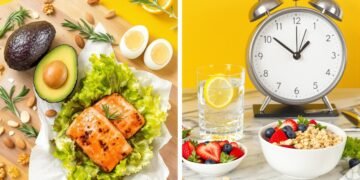



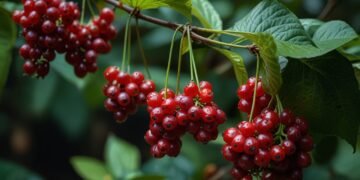
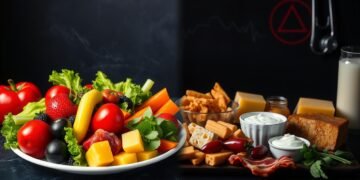





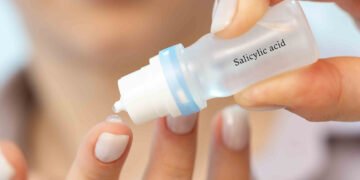







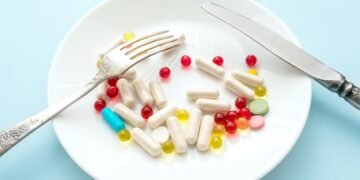







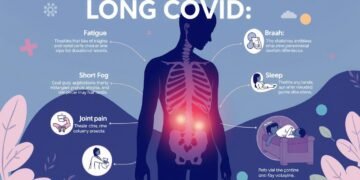








Discussion about this post